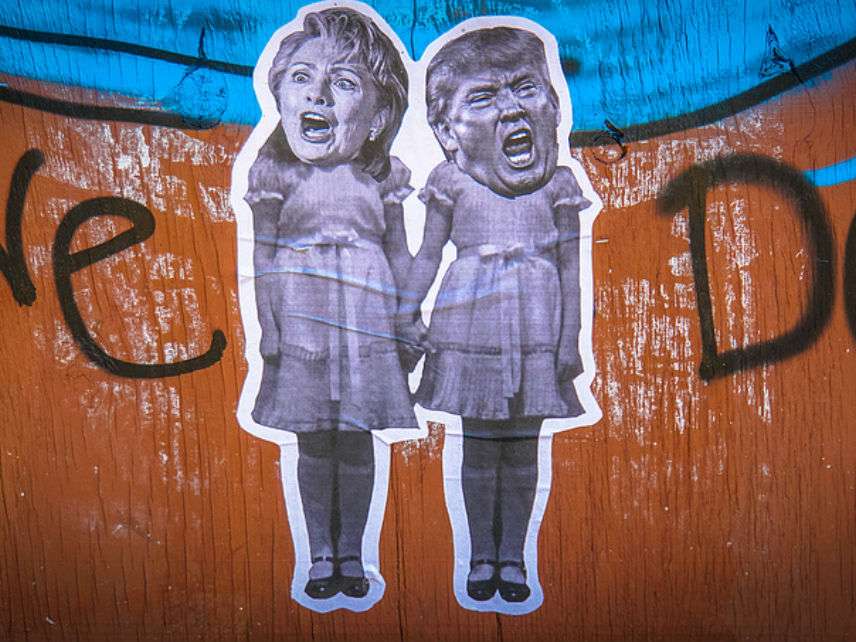How Niger Is Kind of Like Benghazi
It's the interventionism, stupid.

It's always exciting to watch a partisan talking point emerge in real time. Take the tortured analogy between the 2012 attack on the U.S. consulate in Benghazi and the ambush that just killed four American soldiers in Niger. As the talking point metastasizes on Twitter, it's already being echoed by a member of Congress, with Rep. Frederica Wilson (D-Fla.) declaring that Niger "might wind up to be Mr. Trump's Benghazi."
It isn't what she means, but there is one fundamental similarity between the two attacks: Both were the foreseeable effects of aimless intervention. The best way to prevent such meaningless deaths is to stop such meaningless interventions before they get off the ground.
President George W. Bush first sent U.S. troops to Niger in 2005. President Barack Obama sent an additional 100 special forces there in 2013. About 800 American troops there now. The U.S. is building a second, $100 million drone base in the country.
With so much military activity in Niger, American fatalities were bound to happen. A lot of questions remain about this particular ambush; the Senate Armed Services Committee, chaired by Sen. John McCain (R-Ariz.), is likely to seek more details about how the attack occurred. What McCain will almost certainly not address is the point of the U.S. mission in Niger in the first place, just as none of the investigations into Benghazi bothered to reflect on how the U.S.-backed intervention in Libya destabilized the country and created the environment in which Benghazi could take place.
The ranking Democrat on the committee, Sen. Jack Reed (D-R.I.), signaled that he might look at the broader issues at play. "I think the administration has to be more clear about our role in Niger and our role in other areas in Africa and other parts of the globe," Reed said on CNN. "They have to connect it to a strategy. They should do that. I think that the inattention to this issue is not acceptable."
That's true. But Reed isn't exactly innocent of inattention himself. He has been in the Senate since 1997, but he didn't raise concerns about the U.S. presence in Niger before this week.
In the immediate aftermath of the Niger ambush, I predicted that most Americans would forget about the U.S. troops in Niger soon enough. I was almost right—the issue had in fact receded into the background again before Trump blasted it back into the news cycle by making what should've been routine condolences into the latest episode of the Trump Show.
The four American troops killed in Niger are not the first U.S. service members killed outside of the battlefields of Afghanistan and Iraq since 9/11. They are not even the first American fatalities outside the two major wars since Trump took office.
A Navy SEAL was killed in action in Somalia in May to little fanfare. Trump did not remark on the death, either adeptly or boorishly. So the U.S. presence in Somalia, which Trump has expanded, did not make a major impression on the American news cycle. This weekend's truck bombing in Mogadishu, Somalia, killed nearly 300 people, but it quickly fell off the news cycle as well. Revelations that the bombing may have been a retaliation for a failed U.S. operation did not substantively register either.
There are also a number of important differences between the ambush in Niger and the attack in Benghazi, most of which serve to display the craven opportunism at work in tying the two together.
In Niger, hundreds of U.S. troops are on the ground to help local forces fight terrorists. It's not surprising some terrorists would shoot back, and that sometimes they'd hit. It's remarkable that there have not been more casualties.
Benghazi was not the same kind of war zone. The U.S. government had spent a year at that point insisting its intervention in the Libyan civil war had not destabilized the country, despite all the evidence to the contrary. Clinton herself pushed the idea that the attack on the consulate in Benghazi was a spontaneous one, linked to other protests, some of which were violent, at embassies across the Muslim world that day. The Obama administration ended up trying to blame a video.
Obama himself eventually expressed regret about the way the intervention in Libya (whose aftermath saw weapons and fighters flow throughout the region) was handled. But Clinton insisted until the bitter end that she was not to blame for what happened in the country.
The ambush in Niger ought to serve as a clarion call to reevaluate the war on terror in Africa and around the world, and to push Congress to assert its constitutional role in U.S. foreign policy. If instead it just becomes another tool for berating political opponents, it will be as much a failure as the post-Benghazi debate—and a greater disservice to the troops than any boorish comment Trump makes to a grieving widow.


Show Comments (22)